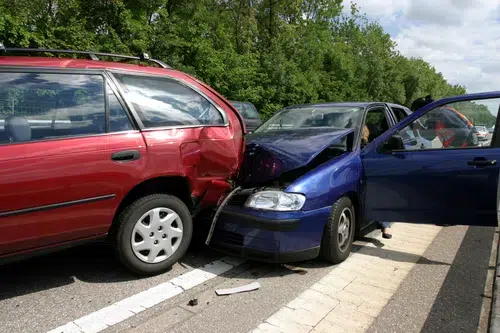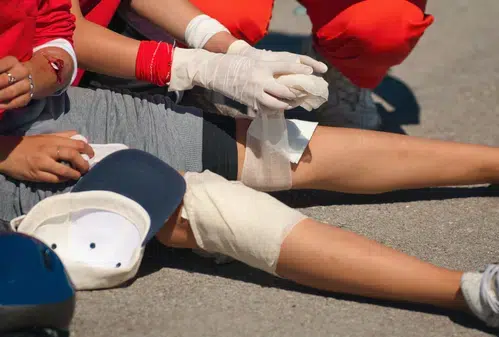 A car accident happens every 56 seconds in Texas. When you’re undocumented and involved in one of these wrecks, you could be worried about a lot more than vehicle damage and potential injuries.
A car accident happens every 56 seconds in Texas. When you’re undocumented and involved in one of these wrecks, you could be worried about a lot more than vehicle damage and potential injuries.
Your immigration status, possible legal consequences, and the looming threat of deportation could weigh on you heavily. With that, it can be very challenging to know what steps to take — and what to avoid doing — when auto accidents occur.
To help in these situations, this resource maps out what undocumented motorists can and should do right after they are in an auto accident in Texas.
Undocumented & in a Car Accident? 10 Steps to Protect Yourself
Just because you are undocumented does not mean that you have zero rights. It also does not mean that you should flee the scene or discuss your immigration status after a car wreck.
If you know how to respond and what to do, it can be much easier to stay calm, stay safe, and safeguard your rights with more confidence.
With that in mind, here are the most important things to do if you’re an undocumented driver involved in a car accident in Texas.
1. Focus on safety first.
 Are you or your passengers injured or too hurt to move? Are you still in harm’s way?
Are you or your passengers injured or too hurt to move? Are you still in harm’s way?
The very first thing to do is figure out if you’re safe where you’re at and, if not, move, so you can safely wait for help.
If anyone involved in the crash is seriously injured or trapped in the path of traffic, call 911 for immediate help.
Saving lives and preventing more injuries should always be the top priorities after car accidents. Requesting and receiving help in these (and other) emergencies is not tied to your immigration status.
2. Call the police.
If you don’t call 911 for emergency assistance, Texas law still requires you to call the police for most types of crashes, including those that result in:
- Injuries or death
- $1,000 or more in property damage
- Vehicles that have to be towed
Although calling the police may intimidate undocumented individuals:
- They are not required to talk about their immigration status when police arrive at the scene.
- They can talk about the facts of the car accidents and only those facts.
- Failing to call police could result in criminal charges, which could raise questions about and risks to immigration status.
3. Get potential injuries checked out ASAP.

If an ambulance arrives at the scene, let emergency responders check you for injuries, especially if you’re feeling sore, disoriented, or displaying any visible wounds. Even if you don’t feel hurt after the wreck, it’s essential to know that:
- Your body could be in shock, and some injuries may not fully present themselves right after the collision.
- You are entitled to medical attention after a crash, regardless of immigration status.
- Medical care at the scene can produce evidence of injuries, and that could be helpful later when it’s time to prove exactly how the accident hurt you.
- If another driver was at fault for the car accident, they can be made to pay your medical bills.
So, don’t skip emergency care if you’re worried about bills or having to talk about your status. Skipping this evaluation could do more harm than good in the long run.
4. Exchange the information you have.
More often than not, undocumented motorists in Texas do not have driver’s licenses or state-mandated auto insurance coverage. Nevertheless, these drivers can and should still:
- Share some available information: This can include names, contact information, and vehicle information.
- Collect relevant information from others: Concentrate on gathering driver’s licenses, insurance, vehicle, and personal information from other parties involved.
Here, it’s also crucial to:
- Avoid discussing any lack of a license or insurance.
- Cooperate while keeping your guard up, taking care not to reveal any unnecessary personal details.
5. Document the scene.
 Take photos and videos of the accident scene, vehicle damage, license plates, and any visible injuries. You may also want to take pictures and record footage of:
Take photos and videos of the accident scene, vehicle damage, license plates, and any visible injuries. You may also want to take pictures and record footage of:
- Other drivers involved
- Witnesses at the scene
- Police when they arrive
- The investigation of the crash as it’s occurring.
This can all serve as evidence that could be critical to:
- Backing up your account.
- Filling in details you’re not aware of.
- Uncovering new potential evidence and/or witnesses.
- Figuring out which parties are liable (at fault) for the car accident.
6. Do NOT overshare.
Never admit fault for the accident, apologize to others involved, or overshare details that could backfire.
This also means being exceptionally vigilant about NOT offering up information about:
- Immigration status
- Lack of a license
- Lack of insurance
That does not mean lying or giving false information to police, which can be a crime. Instead, explain what happened in simple, factual terms. If you don’t know the answer or a specific detail, it’s OK to respond with, “I don’t know” or “I’m not sure.”
7. Have an “automatic” response ready for questions about immigration status.
Your immigration status is irrelevant to a car accident investigation, and you do not have to answer questions about your status, even when police are asking those questions.
Instead, you do have the right to reply with:
- Silence
- “No comment,” redirecting the conversation back to the facts of the accident
If you’re ready to respond with either of these replies, it can be easier to deflect questions about your immigration status and avoid providing information you simply don’t have to (and shouldn’t).
Remember, you cannot be arrested in Texas solely because you are undocumented — and if you become concerned about how a conversation with a law enforcement official is going, skip to step 10 below.
8. Seek follow-up medical care.
 See a doctor after you leave the scene of the accident for a more thorough examination. You could have deeper injuries or trauma that’s progressed since the crash. On top of that, seeing a doctor can mean:
See a doctor after you leave the scene of the accident for a more thorough examination. You could have deeper injuries or trauma that’s progressed since the crash. On top of that, seeing a doctor can mean:
- Additional documentation and evidence regarding how badly you were injured
- Prompt treatments, which could lead to better outcomes and recoveries
- A stronger claim later if another party was at fault and you seek compensation for your injuries, medical bills, lost wages, and other damages
Like emergency medical care after the wreck:
- Ongoing medical treatments shouldn’t be put off or suspended because you’re worried about the bills or your immigration status.
- Not getting medical treatment for car accident injuries can come back to bite you later.
9. Be careful about talking to insurance companies.
Other motorists’ insurance companies may try to get ahold of you after an auto accident. When they reach out, they could try to:
- Act like your friend or ally, even though they are absolutely not on your side.
- Trick you into saying anything they can use to blame you for the motor vehicle accident.
- Threaten, bully, or scare you, with some even going so far as to lie or break the law to get their way.
- Use other tactics to avoid paying legitimate claims.
So, be especially careful if you ever speak to insurance companies after an auto accident. And:
- Do not take what they say as the final “word.” Second guess and double-check everything.
- Do not assume they are looking out for you or your rights. It’s better to assume the opposite — that they are working against your interests.
- Do not feel like you have to go at this alone. See the next step below.
10. Contact an attorney to learn more about your rights.
At any point after a traffic collision, talking to a car accident attorney can give you the answers, support, and guidance you may need to:
- Protect your rights.
- Recover the compensation you may be entitled to, even if you are undocumented in Texas.
Experienced bilingual car accident attorneys can share more in a free consultation, and they will work on contingency, meaning they charge you $0 unless or until compensation is secured for your potential claim.
3 More Important Facts for Undocumented Car Accident Victims in Texas
Along with the above steps, knowing the following facts can help undocumented individuals after auto wrecks in Texas.
The facts are that as an undocumented individual:
- You have the right to file an insurance claim and seek compensation for your injuries and losses when another driver is at fault.
- You cannot be deported simply because you were in an auto crash or got medical care for your crash-related injuries.
- You can talk to a car accident attorney (and retain one) for help protecting your rights moving forward.

